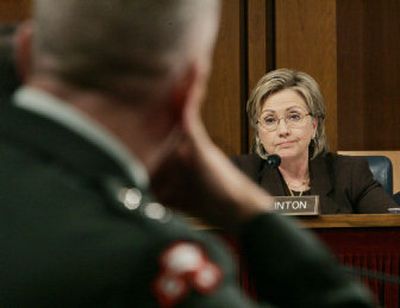U.S. commander in Iraq defends troop numbers

WASHINGTON – The commander of U.S. forces in the Middle East said Wednesday that he had requested an increase in the number of U.S. military advisers in Iraq and had sent another 2,000-Marine unit into the country’s restive western region.
In two back-to-back hearings on Capitol Hill, Army Gen. John P. Abizaid, head of U.S. Central Command, resisted calls by Democrats for troop withdrawals, saying it would lead to further sectarian violence. He defended plans for keeping troop levels at or slightly above the current 141,000 and said he remained optimistic that Iraq could become stable.
Abizaid was met with deep skepticism in the Senate, where even Republicans who have supported the war questioned his judgment on troop levels and his optimistic assessment of Iraqi security forces.
The criticism signaled a more active role by members of Congress in challenging the Bush administration on the war’s conduct.
With Defense Secretary Donald H. Rumsfeld’s pending departure and the Democratic takeover of Congress, top generals are likely to face greater criticism.
“I must say that I come to this hearing with a great deal of skepticism, because, prior to this hearing, there’s been a great deal of obfuscation by the witnesses in front of this committee as to what the truth is,” said Sen. Bill Nelson, D-Fla.
Against a barrage of questions from some lawmakers calling for phased withdrawals and others advocating an increase in troops, Abizaid defended the status quo, warning against timetables and insisting current troop levels were adequate to quell violence and help prepare Iraqi forces.
“Our troop posture needs to stay where it is as we move to enhance the capabilities of the Iraqi security forces,” Abizaid said.
Abizaid said that although sectarian violence remained at unacceptably high levels, it had declined since August, when he told the same Senate committee that Iraq was at risk of sliding into civil war.
Abizaid’s steadfastness on troop levels drew ire from lawmakers on both sides of the aisle, particularly Sen. John McCain, R-Ariz., a probable 2008 presidential contender who has become the most vocal advocate for an increase in U.S. troops in Iraq.
Seizing on Abizaid’s acknowledgment that western Anbar province was not under coalition control and that troops who might have been used to secure the Sunni insurgent stronghold had been diverted to Baghdad, McCain said Abizaid was failing to prevent a return of insurgent control.
“Wouldn’t it make sense to … get both Baghdad and al-Anbar province under control before we have another battle of Fallujah and lose many more lives?” McCain said. “I don’t understand that tactic, general.”
Abizaid conceded that sending 20,000 additional troops into Iraq might temporarily quell violence, but he said it also would upset American efforts to get the Iraqi government to take more responsibility for the country’s internal security.
Nonetheless, Abizaid acknowledged that he planned to increase troop levels in the near term. Abizaid ordered the 15th Marine Expeditionary Unit, which has been on ships in the Persian Gulf for months as a backup reserve force, into Iraq.
In addition, Abizaid said he would request that the number of military advisers in Iraq be “substantially increased,” largely by adding to the size of the nearly 300 embedded teams, now composed of 11 soldiers each. He said the number was still being worked out by his staff.